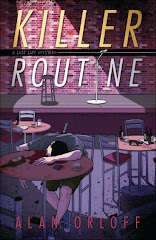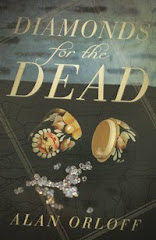Another “classic” blog post to beat the summer doldrums.
When I write, I work with three basic documents.
The first document is the manuscript itself, my "Story." I begin at page one and I'm off. I usually write in linear scene order, start to finish. If I don't know something, I'll put in a line of XXXXXXX's. If I need to check on something I've written, I'll highlight the section in red or yellow. Sometimes I don't even worry about chapter breaks. I just keep my head down and plow ahead, knowing I'll figure everything out during the revision process.
The second document I use is my roadmap ("Notes"). Even though it's a single "document," it's really a mish-mash that serves several functions (it's just easier for me to do it this way, especially when I know I'm going to end up searching frantically through it five months later looking for that certain vital detail I needed YESTERDAY!).
This Notes file includes:
- The outline of the novel, scene by scene
- A list of character names used, sorted by letter of the alphabet, so I don't have too many names beginning with the same letters (too confusing for readers and too confusing for me)
- A brief character sketch of the major players (anywhere from a sentence or two ("uncoordinated, couldn't hit his mouth with a cheeseburger"), up to a few paragraphs). For more detailed bios, I will sometimes open new files--but I've found I rarely consult them!
- Other information I want to include somewhere in the manuscript: nicknames, setting descriptions, types of cars, pets, jokes, possible character names, cool phrases I've decided to plagiarize, etc. I put all this miscellaneous stuff here because I know I'll review the entire file during the revision process.
The third document is my "Snips" file. In it go all the words, sentences, paragraphs, scenes, and chapters that I've written, then decided don't fit. I cut them out of my draft and put them here, just in case I change my mind and need them again. When I finish and realize I'm 8,000 words short, this is where I look first to see if there's anything worth salvaging. Hey, I've learned you can't be too careful.
What "document" system do you use when you write?





















4 comments:
I have a Word folder with the name of the WIP. Inside the folder, I have the main document, a doc with my characters and brief tags on who they are and their purpose to the story, an 'ideas' doc, a doc I named 'random' that has bits and pieces, and a doc that is a quick summary of the plot.
I like to hear other people's methods for organizing unwieldy documents! Thanks.
Elizabeth
Mystery Writing is Murder
Elizabeth,
It sounds like our methods are similar. That gives me comfort.
For the first ms I wrote, I put each chapter in a separate document. Talk about a crazy, mixed-up, unwieldy jumble. I'm glad I learned from that!
(Don't worry society, that ms is safely stowed in the crawlspace under the house.)
I tend to keep all my notes and character information scribbled in notebooks - as well as random ideas for dialogue or action sequences that don't really seem to fit with the overall plan. The only parts that get types up are the actual manuscript and, occasionally, a character list. I have to be honest, I rarely consult any of the notes I've written after I actually start writing the manuscript. I just write. It is only when I get to the end and realise that parts don't make sense or my characters have gone off the wall that I read through what I intended and what I ended up with. Then I spend a lot of time trying to reconcile the two and figure out which direction I really want to go. Possibly this isn't time effective but at least I write. If I stop to consult mid-way I feeze up and start rewriting every little bit and then I rewrite again and I never get to the end.
Cassandra -
Old school (notebooks), very cool. Sometimes I'll tote along a spiral notebook to make notes, too, although often I can't read my handwriting later!
I'm with you--if I started rewriting every little bit as I wrote, I'd NEVER finish anything. And I'm not convinced the end result would be any better, either.
Thanks for visiting the blog and commenting.
Post a Comment